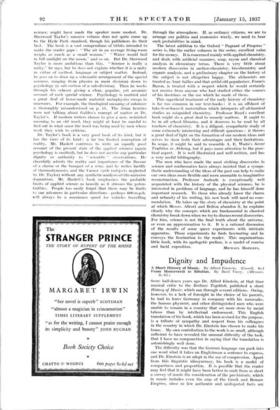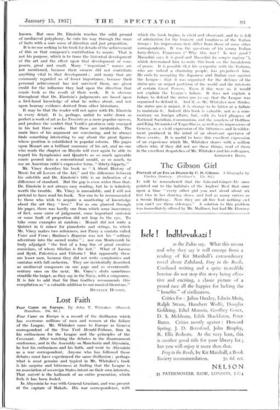Dignity and Impudence
A Short History of Music. By Alfred Einstein. (Cassell. 6s.) From Monteverdi to Sibelius. By Basil Viney. (Allenson. 3s. 6d.)
SoArE half-dozen years ago Dr. Alfred Einstein, at that time musical critic to the Berliner Tageblatt, published a short History of Music, which ran through several editions. Owing, however, to a lack of foresight in the choice of his parents, he had to leave Germany in company with his namesake, the famous physicist, and other distinguished men who were unable to remain in a country that set more store by racial taboos than by intellectual endowment. This English translation of his book, which has been revised for the purpose, is a tribute of sympathy and respect from his colleagues in the country in which Dr. Einstein has chosen to make his home. My own contribution to the work is so small, although sufficient to have revealed the unusual difficulty of the task, that I have no compunction in saying that the translation is astonishingly well done.
The difficulty was that the German language can pack into one word what it takes an Englishman a sentence to express, and Dr. Einstein is an adept in the use of compression. Apart from this linguistic idiosyncrasy, his book is a model of compactness and proportion. It is possible that the reader may feel that it might bave been better to omit from so short a survey of music the consideration of the pre-historic, which in music includes even the .eras of the Greek and Roman Empires, since so few authentic and undisputed facts are
known. But once Dr. Einstein reaches the solid ground of mediaeval polyphony, he cuts his way through the maze of facts with a sure sense of direction- and just -proportion.
It is no use seeking in his book for details of the achievement of this or that composer's contribution to music. That is not his purpose, which is to trace the historical development of the art and the effect upon that development of com- posers, great and small. Many " important " names are -not mentioned, because their owners did not contribute ,anything vital to that development ; and many that are commonly regarded as of lesser importance, because their personal achievement has not survived them, are given credit for the influence they had upon the direction that music took as the result of their work. It is obvious throughout that Dr. Einstein's judgements are based upon a first-hand knowledge of what he writes about, and not upon hearsay evidence derived from other historians.
It may be that the reader will not agree with Dr. Einstein in every detail. It is, perhaps, unfair to write down so perfect a work of art as La Traviata as a mere popular success, and produce the verdict that Verdi's greatness only emerged in his last three works. But these are incidentals. The main lines of his argument are convincing, and he always finds something interesting to say about the great figures whose .position is established in popular esteem. His pages upon Mozart are a brilliant summary of his art, and no one who reads the chapter on Haydn will ever again be able to regard his Symphonies and Quartets as so much agreeable music poured into a conventional mould, as so much, to use an American critic's expressive term, " ibbety-bippety."
Mr. Viney describes his book as " A Short History of Music for all Lovers of the Art," and the difference between his sub-title and Dr. Einstein's title is an indication of a difference of standard. But the gap is even wider than that. Dr. Einstein is not always easy reading, but he is infinitely worth the trouble. Mr. Viney is unreadable, and I will not pretend to have read his book. Nor can he be recommended to those who wish to acquire a smattering of knowledge about the art they " love." For as one glanced through his pages, there was hardly one from which sonic inaccuracy of fact, some error of judgement, sonic important omission or some fault of proportion did not leap to the eye. To take some examples at random : Mozart did not write a Quintet in G minor for pianoforte and strings, to which Mr. Viney makes two references, nor Parry a cantata called Voice and Verse ; Brahms's Requiem was not his solitary adventure into the sacred realm " ; nor can Monteverdi be truly adjudged " the first of a long line of great creative musicians, of whom Sibelius is the last." What of Lassus and Byrd, Palestrina and Vittoria ? But apparently these are lesser men, because they did not write symphonies and cantatas with full orchestra. They are incidentally described as mediaeval composers on one page and as seventeenth- century ones on the next. Mr. Viney's shots sometimes straddle the target, as they say in the Navy, with a vengeance. It is fair to add that Sir Dan Godfrey recommends this compilation as " a valuable addition to our musical literature."
DYNELEY HUSSEY.











































 Previous page
Previous page